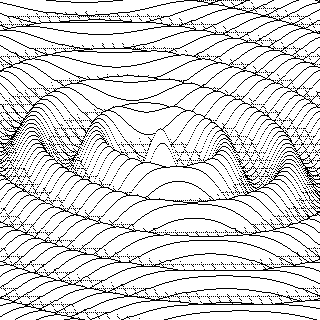#include "buf.h"
#include <stdio.h>
void
file_out(const struct buf *b, const char *filename)
{
const int width = b->width;
const int height = b->height;
const unsigned char *buffer = b->bytes;
FILE *f = fopen(filename, "w");
fprintf(f, "P1\n%d %d", width, height);
for (int i = 0; i < width * height; i++) {
fputc(i % 32 == 0 ? '\n' : ' ', f);
fputc(buffer[i] ? '1' : '0', f); }
fputc('\n', f);
fclose(f);
}
struct buf {
int width;
int height;
unsigned char *bytes;
};
void file_out(const struct buf *, const char *);
static void
pset(const struct buf *b, const int x, const int y, const int val)
{
const int i = x + y * b->width;
if (i < 0 || i > b->width * b->height) return;
b->bytes[i] = val ? 1 : 0;
}
#include "buf.h"
#include <math.h>
#define W 320
#define H 320
double
f(const double x, const double z)
{
const double d = sqrt(x * x + z * z);
const double y = pow(0.97, d) * cos(d);
return y;
}
int
main(void)
{
unsigned char bytes[W * H] = { 0 };
const struct buf b = {
.width = W,
.height = H,
.bytes = bytes,
};
int y_max[W] = { 0 }, y_min[W];
for (int i = 0; i < W; i++) y_min[i] = H;
for (int i = -32; i < H + 32; i++) {
for (int j = 0; j < W; j++) {
const double z = (i - H / 2) / 10.0 * 2;
const double x = (j - W / 2) / 10.0 + z / 4.0;
const double y = f(x, z);
const int py = i + (int)(32 * y);
// plane y=0
if ((i % 8 == 0 || (fabs(x) - (int)fabs(x)) < 0.1) &&
((i + j) % 2 == 1) && y < 0.0 &&
(i < y_min[j] || i > y_max[j]))
pset(&b, j, H - i, 1);
if (i % 4) continue;
// hidden line removal
if (py < y_min[j]) y_min[j] = py;
else if (py > y_max[j]) y_max[j] = py;
else continue;
// draw curve
pset(&b, j, H - py, 1);
}
}
file_out(&b, "main.pbm");
return 0;
}

